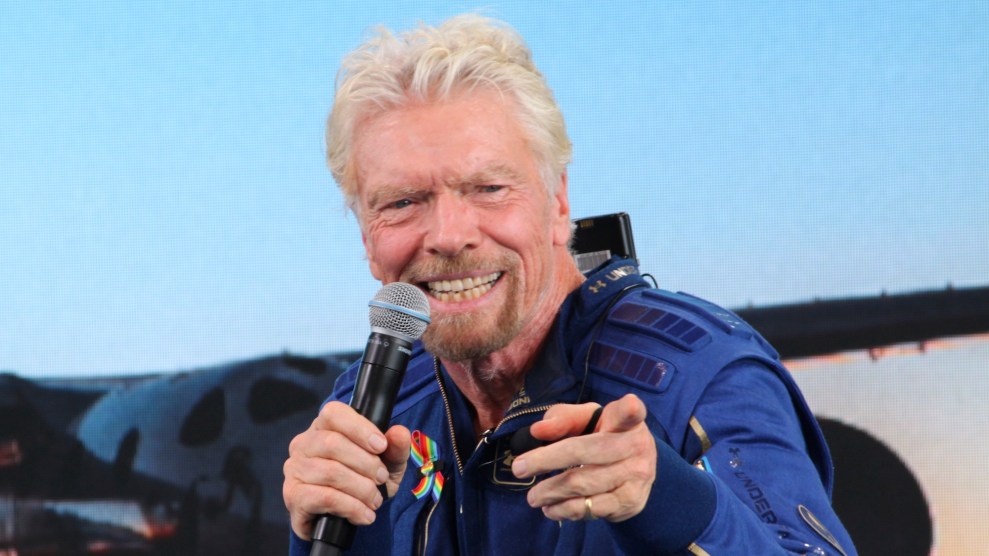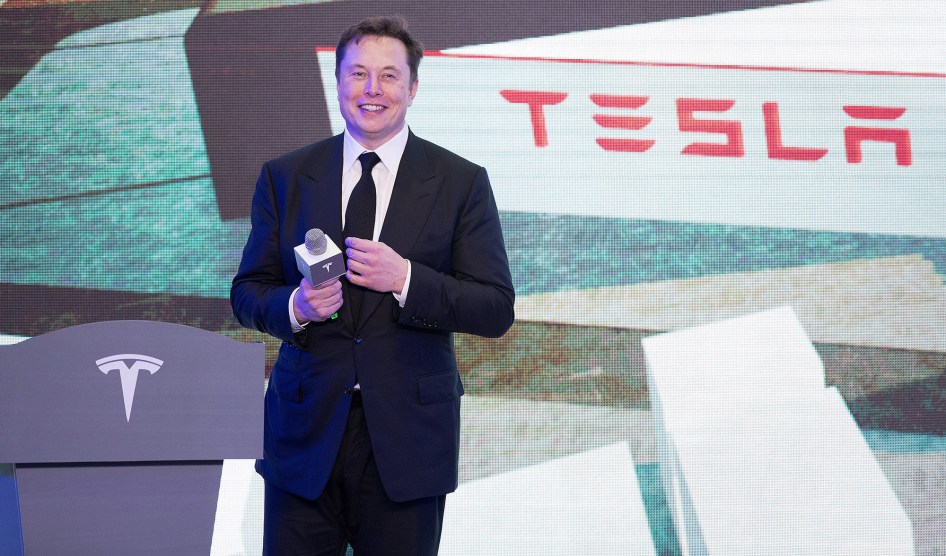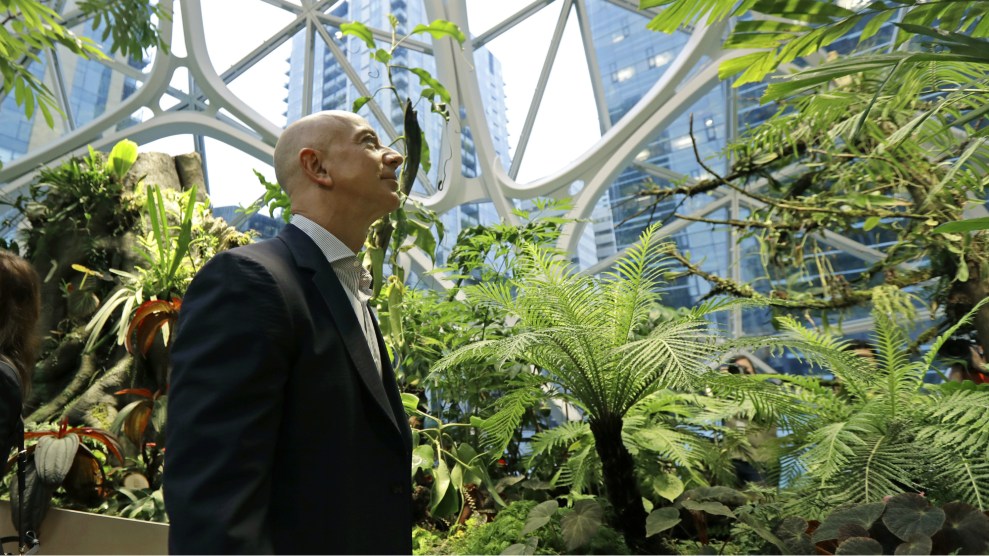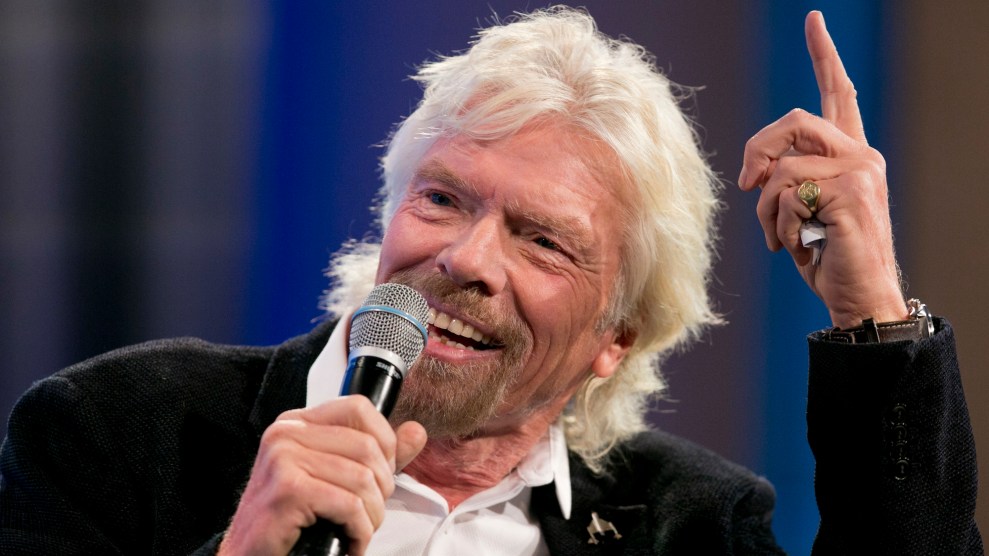
Richard Branson answers students' questions during a news conference at Spaceport America near Truth or Consequences, N.M., on Sunday, July 11, 2021.AP Photo/Susan Montoya Bryan
Hours before he blasted into space on his own private rocket, billionaire Richard Branson posted a goofy video of himself reveling in the moment: The 70-year old cheerfully pedals on a performance road bike across an airfield in the dawn, flanked by immaculate matching Range Rovers, and arrives at his very own spaceport to greet his fellow space traveling employees. There was real joy in the day’s main event—and space travel does represent, literally, the outer limits of what mankind can achieve—but the trip wasn’t just a joyride or simply for the sake of science, of course.
It’s a beautiful day to go to space. We’ve arrived at @Spaceport_NM. Get ready to watch LIVE at 7:30 am PT | 10:30 am ET | 3:30 pm BST https://t.co/PcvGTmA661 #Unity22 pic.twitter.com/4KjGPpjz0M
— Richard Branson (@richardbranson) July 11, 2021
Like fellow billionaires Jeff Bezos and Elon Musk, who have recently captured headlines for their own privately financed space programs, Branson runs a very big business. Branson has been trying for almost two decades to get a space tourism endeavor off the ground, catering mainly to people like him—the extremely wealthy who can afford to pay the $250,000 ticket. Bezos and Musk are also shilling space tourism services, although their plans have colossally higher price tags. To be fair, the other two billionaires are offering to take clients much, much farther than Branson, whose flight only reached 60 miles above the earth. Musk will charge $55 million to take a passenger to the International Space Station, while Bezos will charge a mere $28 million, but will also sit next to the paying passenger himself.
All three billionaires are also pursuing loftier awards. This past April, a subsidiary of Branson’s Virgin Galactic announced it had won a $35 million contract from the Space Force—the newly created space wing of the US military—to transport satellites into low-earth orbit. For their part, both Bezos and Musk seem to be aiming at a wholesale replacement of NASA. Musk’s SpaceX has contracts to deliver supplies to the International Space Station, and Bezos’ Blue Origin has won its own contracts to develop, among other things, a nuclear-powered spaceship.
Around the same time Branson won his satellite contract, NASA awarded Musk’s SpaceX a $2.9 billion contract from NASA to send a man to the moon, an outsourcing of what was once the US government’s most successful technical accomplishment. Musk beat out Bezos for the contract and a handful of defense contractors, who for decades have been the primary recipient of government aerospace contracts.
For all of their iconoclasm, derring-do and technical wizardy (SpaceX’s ability to land its used booster rockets on a floating barge is remarkable), Musk, Bezos and Branson are accomplishing their takeover of a government space program the same way their rivals in the defense industry have always done it: lobbying. Bezos is challenging Musk’s big moon-landing contract with his own army of lobbyists and the aid of his local lawmaker, US Senator Maria Cantwell, who has introduced legislation to give NASA money to pay for Blue Origin to get its own moon-landing project.
SpaceX has spent at least $17.5 million on lobbying the federal government over the last ten years while Bezos’ Blue Origin space company has spent a more modest $7 million since it started hiring K Street firms to push its interest in D.C. (but has also had the benefit of partnering with defense contractors like Lockheed Martin on some of its efforts). Virgin lobbied much more heavily in the early 2000s as it was cobbling its space program together (and trying to get a subsidiary of its airline into the American market) but Branson still dumped a quarter million dollars into wooing Washington last year.
Showy events like Branson’s edge-of-space flight on Sunday can perhaps also be seen in another light: This is an elite group of oligarchs seeking to brand themselves as heirs to the vaunted taxpayer-funded US space program—potential profits and all—despite that in recent years they have gotten billions in contracts and subsidies and some paid zero federal income taxes.

















